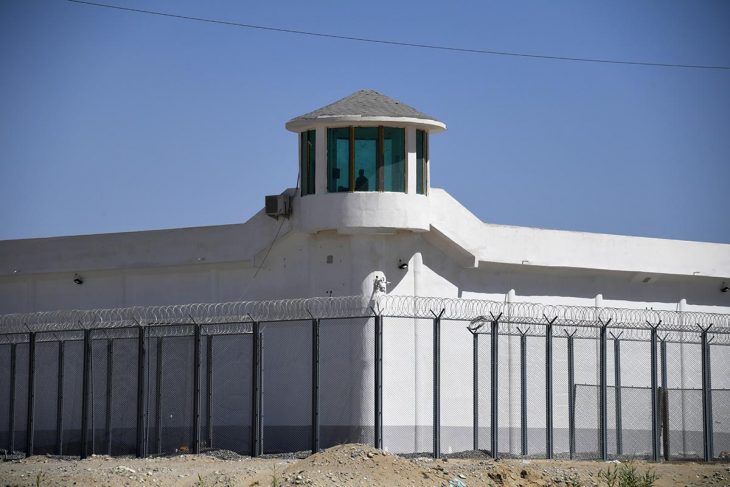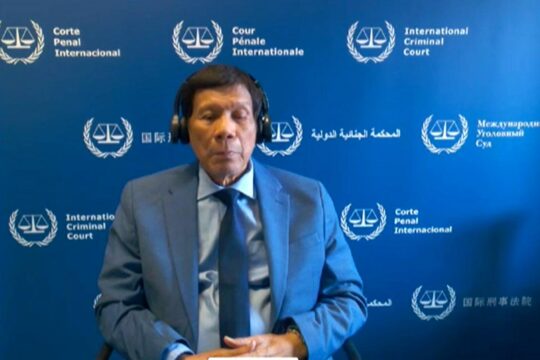In March 2018 Zumrat Dawut, a Uighur businesswoman, was at home in Urumqi, capital of China’s Xinjiang province, when she got a call from the police. “I was called to a police station and was interrogated about phone calls made to and from my cell phone and my business transactions regarding my import and export company,” she recounts. “I was held in a dark room with my hands and arms cuffed to the chair for 24 hours. Afterwards, I was sent to a concentration camp where I spent 62 days and faced psychological and physical torture.”
She says she was freed thanks to pressure from her Pakistani husband and diplomatic contacts, but had to sign a promise of confidentiality and pay a fine equivalent to $2,500 for having violated China’s birth control law and had three children. She was informed of a sterilisation offered by the Chinese government that was “free” and which she says she could not refuse for fear of being sent back into detention. Escorted by the police, she therefore went to a clinic in October 2018 to get her tubes tied. Now a refugee in the United States, Zumrat Dawut tells her story to anyone who wants to listen. “I genuinely believe that the Chinese government is trying to eradicate us,” she warns.
Omer Bekali was arrested in Urumqi in March 2017 and sent to one of the detention camps described by Dawut. Born in the Turpan region, Bekali has been living for several years across the border in Kazakhstan and was in Urumqi on business. “For eight months, I had chains cuffed to my arms and legs,” says Bekali. “Out of a family of eight, six of us faced brutal oppression in the concentration camps. My father died there.” Omer Bekali now lives in exile in Europe.
Many reports and testimonies
The testimonies of Zumrat Dawut and Omer Bekali are among dozens of others in a thick file that sits in the drawers of the International Criminal Court (ICC) Prosecutor. Last July, two Uighur organizations in exile - the East Turkestan National Awakening Movement and the East Turkestan Government in Exile (the Uighurs' name for their land) - filed a request with the ICC for an investigation against senior Chinese officials, including President Xi Jinping, for genocide and crimes against humanity. (The East Turkestan Government in Exile is a Uighur pro-independence organization, unlike the Uighur World Congress, another organization in exile which advocates autonomy instead). At the heart of this complaint are testimonies, internal documents and other evidence of mass detentions, torture, disappearances and forced sterilizations, forced removal of children from their families, targeted surveillance of certain ethnic populations, and bans on religious and cultural practices.
Mass detentions, torture, disappearances and forced sterilizations, forced removal of children from their families, targeted surveillance of certain ethnic populations, and bans on religious and cultural practices."
While repression of Turkish-speaking ethnic groups in the Xinjiang region is not new, multiple reports from international organizations, investigations and testimonies have in recent years pointed to an unprecedented stepping up of the coercive policy carried out by Beijing. This includes the detention in internment camps of more than a million people, accused of "suspicious" behaviour, ranging from contacts with foreigners to religious and cultural practices such as wearing a veil, beard or refusing to eat pork. Beijing’s official line is that it is to fight Uighur separatism and terrorism by “re-educating people contaminated by extremist religious ideologies” in “education and vocational training centres”. But the testimonies of survivors and internal Chinese documents revealed by the International Consortium of Investigative Journalists tell of a programme of indoctrination through learning the thoughts of Xi Jinping and writing self-criticism under torture.
Various sources, including official documents, allege that many of the prisoners are also subjected to forced labour. Their children are said to be taken from their families and into state care in ultra-secure boarding schools, in a programme not limited to the children of detainees and exiles. A report by German researcher Adrian Zenz examines several local policies that force minority children to enter these boarding schools and separate them from their families. Zenz as well as several testimonies - including that of Zumrat Dawut - accuse China of pursuing a birth control policy on the Uighur population. According to Adrian Zenz's survey, published last July, contraception and sterilization campaigns are being carried out on a large scale in the predominantly Uighur prefectures of southern Xinjiang province.
Applying the Rohingya jurisprudence
"We have wanted for some time to mobilize international justice," says Salih Hudayar, "Prime Minister" of the East Turkestan government-in-exile, with regard to the ICC complaint. According to him, the international community has not realized the scale of what is happening to the Uighurs. "When we talk about genocide, we are not taken seriously. Yet we have evidence that a policy of birth control is being pursued, as well as the forced removal of children from their families, both of which constitute the crime of genocide. (...) For us, it was a question of putting this firmly on the table by deferring to international justice," he explains. In his view, this path was cleared by the ICC's decision in 2019 to investigate the crimes committed against the Rohingya of Myanmar.
As long as part of the criminal conduct occurs on the territory of a State Party, the ICC has jurisdiction over the whole conduct"
Like China, Myanmar has never recognized the jurisdiction of the international Court, preventing it from investigating crimes committed on its territory. But the ICC judges ruled that the Court could exercise jurisdiction over Myanmar crimes partially committed on the neighbouring territory of Bangladesh – an ICC State Party - including acts that could be characterized as crimes of deportation and persecution on ethnic and religious grounds. "As long as part of the criminal conduct occurs on the territory of a State Party, even if another part of the same conduct occurs on the territory of a non-State Party, the ICC has jurisdiction over the whole conduct," says lawyer Anne Coulon of the London-based law firm Temple Garden Chambers, which is handling the Uighur organizations' request for an investigation. “There is credible evidence to show that Uighurs and other Turkic people are facing a similar situation to the Rohingya: they are forced into crossing the Chinese border, fleeing persecution to other countries such as Tajikistan – which is a party to the ICC,” continues her colleague Rodney Dixon. “That can constitute deportation. But we have elements showing that, when they actually manage to flee to these other countries, Chinese officials arrange for them to be arrested, rounded up in these foreign territories to be brought back to China, where they are sent into detention. That also constitutes deportation, and forms part of the alleged genocide and crimes against humanity.”
First ICC rejection
However, on December 14, the ICC Prosecutor's Office considered that the "precondition for the exercise of the Court's territorial jurisdiction did not seem to be established with regard to the majority of the cases presented" in the request for investigation by Uighur organizations - namely, acts committed within Chinese territory. With regard to the alleged acts of forced transfers from Tajikistan, which could have been considered a precondition for crimes committed on the other side of the border, ICC Prosecutor Fatou Bensouda's office felt that they did not have enough evidence to launch an investigation. The acts "occurring on the territory of the States Parties do not appear, on the basis of the information available, to meet the material elements of the crime of deportation," the ICC argued in its report.
Is that the end of it? “The process is ongoing and we are continuing with our case,” replies Dixon, who says new evidence is being gathered to be presented to the ICC early in the year as part of a request for review of its decision. “The OTP didn't question the evidence we have provided,” he says. "But in order to establish territorial jurisdiction, the Prosecutor needs further evidence of the part of the crimes committed in ICC member States.”
In order to establish territorial jurisdiction, the Prosecutor needs further evidence of the part of the crimes committed in ICC member States.”
While the deportations of Rohingya were already widely documented, notably by international organizations, at the time of the request for investigation, this is not the case for deportations of Uighur and other Turkish-speaking ethnic groups from Tajikistan to China, Dickson argues. “In our case, although these deportations are known, there is limited information in the public domain. People haven't been investigating this situation on the ground as extensively. So we have to do that work ourselves.”
"All international justice seems far away at first"
Collecting evidence is further complicated by the Covid-19 pandemic that hit the planet in 2020, say the lawyers. “We have evidence that Chinese officials are present in these countries and have arrested these people themselves or put pressure on the local authorities to send them back,” says Coulon. “We are now gathering evidence to show that these are not just isolated arrests,” adds Dixon. “These arrests and transfers of people to China are done unlawfully, in a coercive and widespread way. According to our sources, we are talking about thousands of people affected. We have evidence indicating this is happening in other countries as well, such as Egypt and Saudi Arabia, with the same pattern. It is a general policy.”
Despite this initial setback, London lawyers assure us that the ICC Prosecutor's office is open to a review of the situation. For Salih Hudayar, the request for an investigation, linked to the many reports and testimonies, has already had an effect. “More and more media and organizations talk about genocide today. This is already a step forward," he says. "We knew when we made this request to the Court that the road to justice would be long. Any international justice seems far away at first. But it is now that the steps must be taken in order to succeed one day.”






